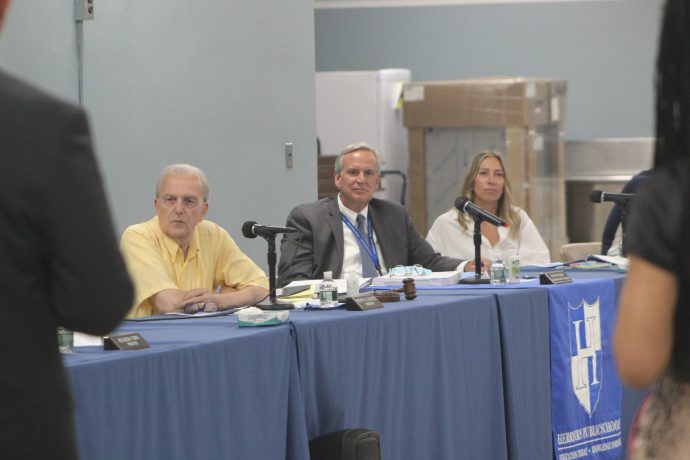Herricks administrators presented broad changes to the elementary and middle school’s gifted and talented program at a board of education meeting last week, aimed at moving away from a rigid structure towards one more embracing of unrecognized students.
To be rolled out over the next two years, the district’s Gemini program will include parent input as a criterion for child selection, opportunities for middle schoolers to be accepted and allowing children to engage in seminars once a week during their lunch period.
“We feel this provides a very nice seamless transition and creates a more cohesive program from K through eight,” said Elizabeth Guercin, assistant superintendent for instruction at Herricks Public Schools. “All this really aligns nicely – all K-8 – aligns very nicely with the Herricks portrait of a graduate.”
Previously, the official conditions to be qualified and selected were scores on tests used to identify potentially gifted students. Now, the identification process will modify one of those exams and include a “parent inventory of characteristics.”
“A lot of parents do share with us that their children have behaviors that we may not see in school,” Guercin said. “We thought it was equally important to have a parent inventory of characteristics so that parents too would have a voice in how those students are looked upon.”
The exam that will be modified is the Renzulli rating scale, which Guercin says would be more aligned with specific behaviors of the Gemini program.
Also changing next year are age qualifications. Students above 5th grade, including new entrants to the district, were not offered the chance to be considered for the program. Now, middle school principal Brian McConaghy is saying that would change under his proposal.
“One of the things that we’re looking for is the opportunity for students who are either new to the district or who have grown through the years and maybe did not qualify in elementary school,” McConaghy said. “We felt it would be a good opportunity if we had new children who are interested in the program … to see how they’re doing in their courses, see how they scored on the NWEAs, to have conversations with the parents and counselors about if this would be an appropriate placement.”
The curriculum of the Gemini program would also see a shift, with the biggest change happening in the form of “enrichment seminars,” which would take place once a week during a child’s lunch period. This format would replace the existing grade six Gemini science section.
“What we think would really work best for our students would be to have interdisciplinary seminars,” McConaghy said. “We think these are opportunities for kids to really explore things that are project-based, that are collaborative, that really involve research skills that we think would benefit them as they move onto the high school.”
McConaghy did acknowledge how these seminars would occur during a lunch period, as well as his stance on children missing lunch.
“Now I am not a proponent of kids missing lunch for academics,” McConaghy said, “But we do feel that there are some kids who one day a week would benefit from an opportunity to have lunch and have really interesting conversations with their peers and with their teachers.”
Though the changes presented by Guercin and McConaghy are not subject to a vote by the board of education, Trustee Jim Gounaris expressed his concerns that the program, in general, does not address students who narrowly miss qualifying.
“A rising tide lifts all ships,” Gounaris, a 10-year member of the board, said. “I believe personally that a lot of these students who are just on the cusp who don’t make it in, if they were in some of these classes, and they were challenged by being competitive with some of these Gemini students, they too would excel to the same heights.”
Guercin noted that a curriculum for fostering all students currently exists under the school-wide enrichment model, but spoke to the Gemini program as highly specific for kids with special needs.
“I do believe that we’re that kind of district where we want to give every kid that equal opportunity and I think we do such a good job of that,” Guercin said. “But there are select students who have a different drive, who have a different motivation, who have a different ability level, who have a different interest.”
“There’s very different approaches and criteria in terms of advanced coursework versus a gifted program,” Herricks Superintendent Fino Celano said. “This is a separate population of students who in a sense, as Liz is alluding to, have special needs.”
Celano added how the proposed adjustments seek to remedy the gifted program into moving away from the current “structured” Gemini class into something more inclusive.
But for trustee Juleigh Chin, concerns extend beyond the program’s curriculum and with the identification of children as Gemini students.
Chin gave an anecdote of a Herricks graduate who was not identified for the gifted program and didn’t find herself encouraged by school councilors to pursue pharmacy. Chin said she recently attended that student’s graduation party as the number two graduate of St. John’s University’s doctorate program for pharmaceutical sciences.
“I’m just afraid of when we start putting these labels on kids it buckets them not only with the way they see themselves or the way that their parents see them but even as their educators see them,” Chin said. “I just am afraid of any kind of label, good bad or indifferent because sometimes a kid themselves will start to believe the label that’s put on them.”

